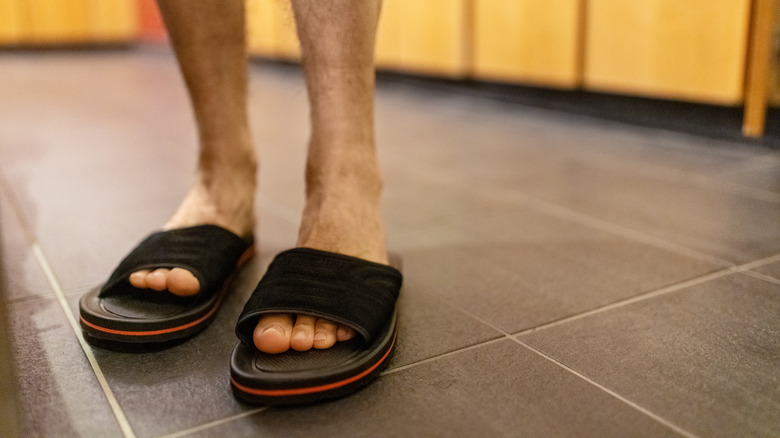The Strict Pool Swimwear Rule Many Tourists Don't Know Before Visiting Italy
Most avid travelers will know that different countries and cultures often have unique rules about clothing and attire — especially in public spaces. From destinations around the world that expect visitors and locals to dress modestly — especially while visiting religious or historic sites — to countries that encourage travelers to avoid certain garments altogether, there's never a one-size-fits-all approach to "dressing appropriately" while abroad. And as travelers, it's always important to respect and follow these local customs. After all, you probably wouldn't be happy if someone disrespected your culture, so why do it to someone else?
However, between researching what not to pack when traveling to places like Malaysia, knowing how to be a more mindful tourist when visiting India, or even looking into the clothing etiquette to follow during a trip to the Cook Islands, there are some destinations that might fall between the cracks because of their seeming familiarity. One of these is Italy.
Because, despite being a popular tourist destination, there's a surprising rule that might shock unassuming visitors planning to hit up one of Italy's public swimming pools: mandatory swimming caps. Yeah, the ones you'd normally see a competitive swimmer wear. But this not-so-recent requirement — enforced by plenty of local pools, water parks, and campsites — isn't just for show. In fact, the rule aims to help maintain hygiene standards and keep the pool water clean, and choosing to ignore the request could prevent you from getting in the water.
Mandatory swimming caps are a thing at Italian pools
Believe it or not, many public pools, water parks, and even hotel facilities across Italy require that visitors don a swimming cap if they're planning on entering the water. While the rule might seem strict, it's important to understand that it's not meant to inconvenience swimmers. It's all about creating a cleaner, more enjoyable experience for everyone.
Specifically, according to Suncamp — a tour operator that specializes in camping holidays — the whole point of the caps is to keep the pool clean from hair, dirt, and flakes of skin that can come from your head. And let's face it, when they put it that way, swimming caps sound like a pretty good idea that should be enforced everywhere.
That said, while the rules around whether you're expected to wear a swimming cap can seemingly vary from place to place, it's always better to be prepared and pre-pack your own swimming cap instead of scrambling to get one after being denied entry. Otherwise, if you feel like a swimming cap just doesn't fit the vibe, doing your research and even calling ahead to ensure the rule isn't enforced where you're planning to swim can save you from the embarrassment of being turned away at the door.
Other Italian poolside quirks
Beyond obligatory swimming caps, Italy's pool culture can be quite surprising for U.S. visitors who aren't used to strict hygiene rules or communal changing practices. For starters, there's the obsession with cleanliness that extends far beyond just wearing caps. Whether it's mandatory pre-swim showers or certain facilities' quirky foot baths that you're required to use before entering the pool, their emphasis on hygiene is unmistakable. Oh, and don't be shocked if you're ever asked to take off your shoes before walking into the locker room. It's a common practice aimed at — you guessed it — maintaining cleanliness.
Along with that, another unexpected rule for many visitors is locals' tendency to wear a bathrobe or towel-style poncho when moving between the showers and the changing area. Because despite what you might be used to back home, a flimsy towel just won't cut it, according to Italian standards. Lastly, don't be surprised to see other swimmers keep their swimsuits on — even while showering off at the end of the day. It's basically an unspoken rule that going commando, even in the shower, is a no-no.


